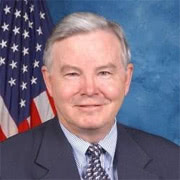The Internet Gambling Prohibition, Poker Consumer Protection, and Strengthening UIGEA Act of 2011, or H.R. 2366, has received a great deal of attention since it was first introduced by Texas Republican Joe Barton, who has given the bill its most common moniker, “The Barton Bill”. The bill is often lauded as the salvation of online poker in the United States, although, in reality, should the bill pass into law without significant revision, most players will find that they’ve gotten far more than they’ve bargained for.
 Joe Barton is best known for his frequent political blunders, such as apologizing to British Petroleum about the “witch hunt” that was taking place in the US as the government attempted to hold the industrial giant accountable for the unparalleled environmental disaster they created. Despite his placement as chair of the Energy and Commerce committee, Barton has frequently made statements denying the existence of global warming and criticizing the utilization of wind power, as “Wind is God’s way of balancing heat. Wind is the way you shift heat from areas where it’s hotter to areas where it’s cooler. That’s what wind is. Wouldn’t it be ironic if in the interest of global warming we mandated massive switches to energy, which is a finite resource, which slows the winds down, which causes the temperature to go up? Now, I’m not saying that’s going to happen, Mr. Chairman, but that is definitely something on the massive scale. I mean, it does make some sense. You stop something, you can’t transfer that heat, and the heat goes up. It’s just something to think about.” While it’s certainly possible for good legislature to come from lousy politicians (especially when the bill is co-sponsored by 11 others), it’s often wise to consider the the source of a bill before assuming that it will be an automatic success.
Joe Barton is best known for his frequent political blunders, such as apologizing to British Petroleum about the “witch hunt” that was taking place in the US as the government attempted to hold the industrial giant accountable for the unparalleled environmental disaster they created. Despite his placement as chair of the Energy and Commerce committee, Barton has frequently made statements denying the existence of global warming and criticizing the utilization of wind power, as “Wind is God’s way of balancing heat. Wind is the way you shift heat from areas where it’s hotter to areas where it’s cooler. That’s what wind is. Wouldn’t it be ironic if in the interest of global warming we mandated massive switches to energy, which is a finite resource, which slows the winds down, which causes the temperature to go up? Now, I’m not saying that’s going to happen, Mr. Chairman, but that is definitely something on the massive scale. I mean, it does make some sense. You stop something, you can’t transfer that heat, and the heat goes up. It’s just something to think about.” While it’s certainly possible for good legislature to come from lousy politicians (especially when the bill is co-sponsored by 11 others), it’s often wise to consider the the source of a bill before assuming that it will be an automatic success.
The Barton bill does make playing online poker in the United States legal, but guess what? It’s already legal. There’s nothing wrong with playing poker online in the US, as long as you don’t fund your account through your bank. Therefore, legal changes in the US need to be made to the way payments are processed, not the “legality” of playing poker online.
The bill also bans the use of credit cards to fund poker accounts, which the bill names as an attempt to prevent fraud. Whether intentional or not, this is much more an instance of legislated morality, where people will find it more difficult to gamble away money that they don’t have. There is also an element of classism present in the emphasis on this restriction, as it requires that players have more liquid assets to be able to play, and liquid assets of this sort are far more common among Barton and his fellow Tea Partiers than among the average American.
The bill also states that it wishes to preserve “state and tribal rights,” but what this really means is that Barton is rallying for more governmental control. If the bill passes as currently written, not only will the US Government have more control over internet regulation and poker winnings in particular, but a new governmental department will be created for the sole purpose of monitoring online poker activity. This department will not only ensure that all poker winnings are properly taxed (at a rate yet to be determined), but will also prosecute players who are caught cheating– using a bot or cheating in any way could lead to up to three years in already overcrowded prisons.
While American players are looking everywhere from a reprieve from the current state of poker in the United States and the Department of Justice witch-hunts for companies that accept money from US players, the best answer is very rarely to pick the very first alternative that comes along. In this case, choosing the Barton bill means sacrificing the welfare of the long term for an immediate gain.